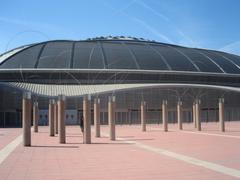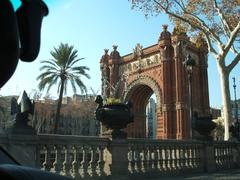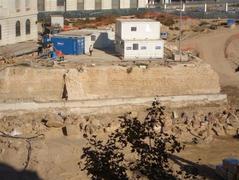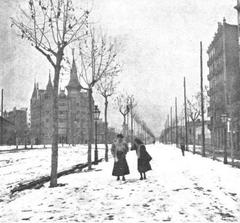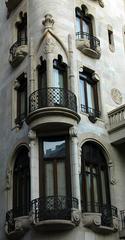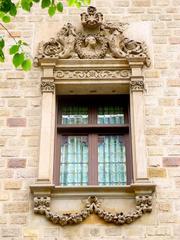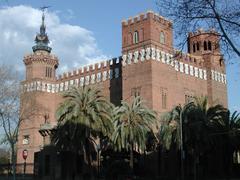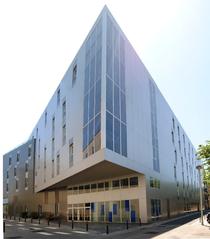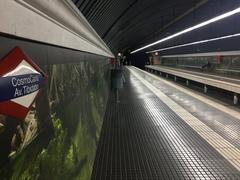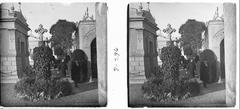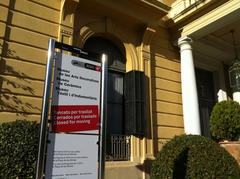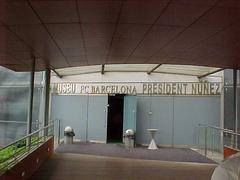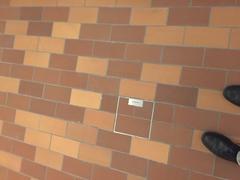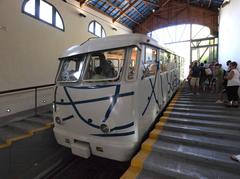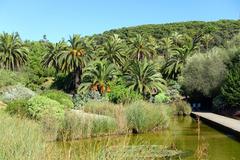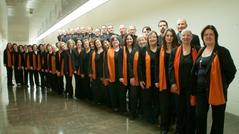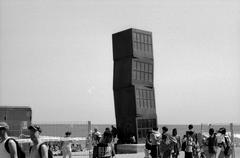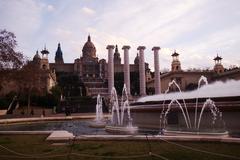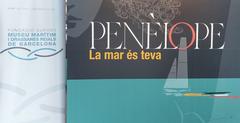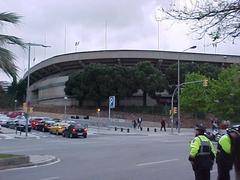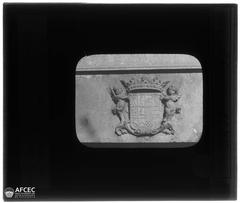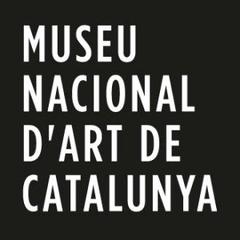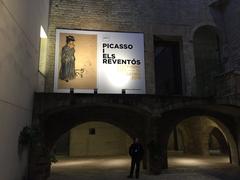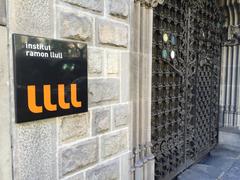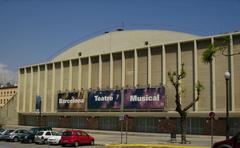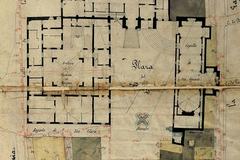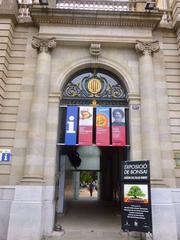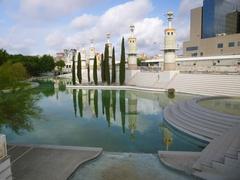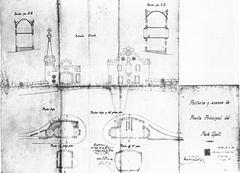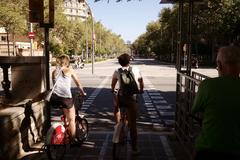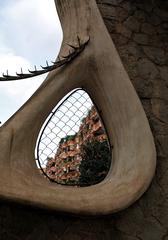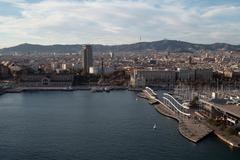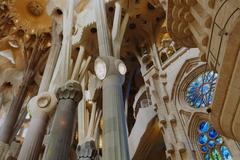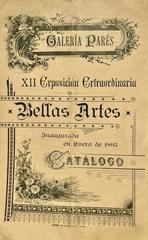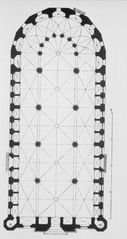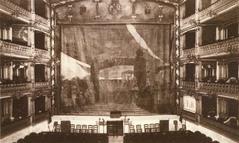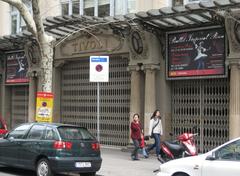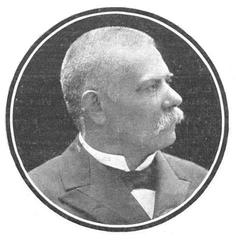Seu Universitat Oberta de Catalunya Visiting Hours, Tickets, and Historical Site Guide in Barcelona
Date: 03/07/2025
Introduction
Barcelona, renowned for its historical depth and innovative spirit, is home to the Universitat Oberta de Catalunya (UOC)—a trailblazer in online higher education. Founded in 1995 as Spain’s first fully online university and one of Europe’s earliest, UOC has transformed the academic landscape, serving over 35,000 students as of 2025. While its core is digital, UOC’s physical sites—most notably its administrative headquarters on Avinguda del Tibidabo and the innovative Poblenou Campus in the 22@ Innovation District—offer a distinct window into the fusion of education, technology, and architecture in Barcelona (Meet Barcelona, UOC Official Website).
This comprehensive guide details UOC’s history and significance, practical visitor information—including hours, access, and tickets—and highlights nearby attractions, travel tips, and accessibility features. Whether you’re an academic, traveler, or local curious about Barcelona’s digital transformation, this article will help you plan your visit to one of the city’s most forward-thinking institutions.
Historical Development and Cultural Significance
Founding and Growth
Established in 1995, the UOC pioneered the online university model in Spain. Its mission: to meet the evolving demands of a knowledge-based society through information and communication technologies (ICT). Starting with just 344 students, it quickly expanded, reaching more than 19,000 Catalan students by 2005 and over 35,000 students from 36 countries by 2025 (Meet Barcelona).
Key milestones include:
- 1995: University inauguration and launch of initial academic programs.
- 2000: Establishment of the Internet Interdisciplinary Institute (IN3), driving digital research.
- 2000s–2020s: Rollout of bachelor’s, master’s, and doctoral programs, international recognition, and consolidation of its physical presence in Barcelona.
Institutional Impact
The UOC has become a global model for flexible, accessible, and innovative digital education, aligning its offerings with the Bologna Declaration for European higher education compatibility. Its commitment to lifelong learning and societal contribution is reflected in both its academic programs and its research, notably through the IN3 Institute (GUNi Network).
Planning Your Visit: Hours, Tickets, and Access
Main Locations
- Headquarters & Rector’s Office: Avinguda del Tibidabo, 39-43
- Poblenou Campus: Rambla del Poblenou, 156, 08018 Barcelona (in the 22@ Innovation District)
- Support Centers & Libraries: Various locations, including Avinguda de les Drassanes
Visiting Hours
- General Office and Campus Hours: Monday–Friday, 9:00 AM–6:00 PM
- Public Events: Hours may differ according to the event schedule; always check the UOC events calendar or official contact page before your visit.
Tickets and Entry
- Admission: Free for general visits, but access is usually by appointment or during scheduled public events, lectures, or exhibitions.
- Guided Tours: Available for academic or professional groups by prior arrangement—email or use the contact form via the UOC website.
Getting There
- Metro: Line L7 (Avinguda Tibidabo) for the headquarters; Line L4 (Llacuna) for the Poblenou Campus.
- Bus: Multiple city lines, including H2, 22, 196, H16, and 7.
- Parking: Limited street parking; public transport is recommended for sustainability and convenience.
- Biking: The city’s Bicing system and dedicated bike lanes make cycling an easy option.
Accessibility
- All UOC facilities are accessible for visitors with reduced mobility, with ramps, elevators, and adapted restrooms. If you have specific accessibility needs, contact the university in advance for personalized assistance.
What to See: UOC’s Architectural and Academic Highlights
Architectural Features
- Poblenou Campus: Modern, sustainable design with open-plan interiors, abundant natural light, and flexible collaborative spaces. The campus incorporates historic industrial structures, such as the Can Jaumandreu Complex, into its innovative environment.
- Sustainability: The campus is built to high environmental standards and aligns with the United Nations 2030 Agenda for Sustainable Development.
- Digital Infrastructure: Smart classrooms, high-speed internet, and hybrid event technology are standard throughout.
Academic and Research Centers
- Internet Interdisciplinary Institute (IN3): A research hub for digital society, online learning, and e-governance (IN3 Institute).
- eHealth Center and other research units: Focus on digital health, social innovation, and emerging technologies.
Cultural Activities
- Events and Workshops: Public lectures, exhibitions, workshops, and digital arts events are held regularly. Check the UOC cultural agenda for current offerings.
- Community Engagement: The UOC collaborates with the Xarxa Vives and other networks to promote research, cultural exchange, and interdisciplinary arts (UOC Cultura).
Practical Tips for Visitors
- Appointments: Arrange your visit in advance, especially for guided tours or meetings.
- Event Planning: Consult the events calendar for exhibitions, conferences, or public lectures.
- Photography: Exteriors and public spaces may be photographed, but always ask before photographing people or research areas.
- Languages: Catalan and Spanish are primary; English is widely used in international activities.
- Nearby Dining: Rambla del Poblenou and surrounding neighborhoods offer a variety of restaurants and cafés.
Nearby Attractions and Amenities
- Tibidabo Amusement Park: Historic park with panoramic city views, near the UOC headquarters.
- Parc de Collserola: Expansive green area ideal for hiking.
- Rambla del Poblenou Monument: Cultural landmark celebrating the neighborhood’s industrial past.
- Poblenou Beach: Easily accessible for seaside relaxation.
- Can Framis Museum: Showcasing Catalan contemporary art.
- Design Museum of Barcelona (Museu del Disseny): Close to the Poblenou Campus (Design Museum).
Frequently Asked Questions (FAQ)
Q: Can tourists visit UOC’s physical locations?
A: Yes, but access is primarily by appointment or during public events. The UOC is not a traditional open campus.
Q: Are there entrance fees or tickets required?
A: No, general admission is free. Some events or workshops may require registration.
Q: Are guided tours available?
A: Yes, for groups and by prior arrangement.
Q: Are the facilities accessible for people with disabilities?
A: Yes, all main sites are accessible.
Q: How do I get the latest information on events?
A: Check the UOC events calendar and cultural agenda.
Enhance Your Visit
- Virtual Exploration: Explore the campus virtually through resources like 30.uoc.edu for photo galleries and interactive maps.
- Stay Connected: Follow UOC on social media and subscribe to newsletters for updates on academic and cultural events.
- Download the Audiala App: For curated travel guides and up-to-date information on Barcelona’s educational and cultural sites.
Summary and Recommendations
The Universitat Oberta de Catalunya is a beacon of digital innovation and educational accessibility. Its physical sites showcase sustainable architecture and serve as hubs for research, community events, and cultural engagement within Barcelona’s dynamic urban context. Visitors can enjoy a blend of academic enrichment, modern design, and proximity to the city’s top attractions. For the best experience, plan ahead, check event schedules, and take time to explore the surrounding neighborhoods. UOC exemplifies the future of education in one of Europe’s great cities (UOC Official Website, IN3 Institute, Barcelona City Guide).
References
- Visiting Universitat Oberta de Catalunya: History, Visitor Info & Barcelona’s Academic Landmark, 2025, Meet Barcelona (Meet Barcelona)
- Visiting the UOC Campus in Barcelona: Hours, Tickets, Architecture, and What to See, 2025, UOC Official Site (UOC Official Website)
- Visiting the Universitat Oberta de Catalunya (UOC) in Barcelona: Hours, Access, and Cultural Insights, 2025, Barcelona City Directory (Barcelona City Directory)
- Internet Interdisciplinary Institute (IN3) and Research at UOC, 2025, GUNi Network (GUNi Network)
- Visiting the UOC Campus in Barcelona: Hours, Tickets, Architecture, and What to See, 2025, Wikipedia (Wikipedia)
- Visiting the Universitat Oberta de Catalunya: Visitor Information, 2025, UOC Culture (UOC Culture)
- Barcelona City Guide, 2025, Spain Tourist Information (Spain Tourist Information)
